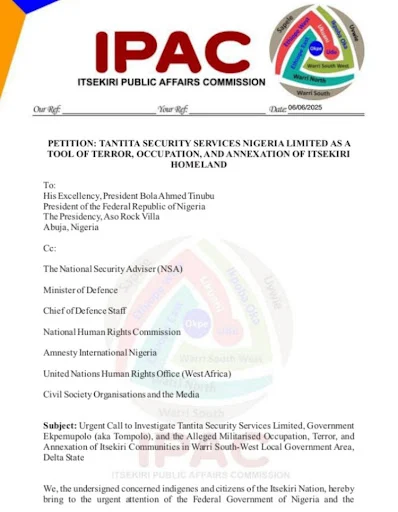Untold Story About Itsekiri's Fight Against Pipeline Surveillance Contract Awarded to TompoloFeature
Untold Story About Itsekiri's Fight Against Pipeline Surveillance Contract Awarded to Tompolo
Feature
A call on President Bola Ahmed Tinubu to Stand Firm Against the Itsekiri's Demands to Cancel Tompolo's Pipeline Surveillance Contract
By Ezekiel Kagbala
Recently, tensions have flared between the Itsekiri and Ijaws particularly the Ward delineation of the Warri Federal Constituency in Delta State. Perhaps some Itsekiri's felt that the exercise has exposed their long-hidden secret used to manipulate voting capacity and dominate their neighbors.
They resorted to using the strategy of trying to eliminate anything beneficial to Ijaws, Urhobo, and other ethnic nationalities in Delta State by petitioning the presidency to stop Tompolo's Pipeline surveillance contract. Ijaws and Urhobo indeed have a heartless neighbor who wants to snatch what is beneficial to everyone by exploiting their closeness to the presidency.
Privileged information has surfaced indicating that some Itsekiri individuals are lobbying in Abuja for the presidency to cancel the oil facility surveillance contract being handled by High Chief Government Oweizide Ekpemupolo alias Tompolo.
Their devilish moves have continued to raise questions about the motivations behind such actions and the broader implications for the region's development.
Itsekiri and Ijaw communities have historically coexisted, but competition for resources and political power has often led to friction. The recent actions of some Itsekiri individuals against Tompolo's contract can be seen as a manifestation of this rivalry.
While some may view the Itsekiri's lobbying efforts as a legitimate pursuit of their interests, it is essential to recognize that such actions can be detrimental to the collective progress of the Niger Delta.
The region's interest should not be sacrificed at the altar of ethnic rivalry. Instead, the focus should be on collaboration and unity. The recent calls from the Itsekiri groups and the petition to cancel Tompolo's contract are not only misguided but also detrimental to the broader interests of Nigeria's oil economy, peace, and security in the region.
Tompolo, a figure often misunderstood and misrepresented, has emerged as a beacon of hope for the Niger Delta. His commitment to peace and development is evident in his efforts to engage the youth of the region, providing them with employment opportunities and a stake in the nation’s economic future. Unlike the Itsekiri's demands, which seem to stem from a place of self-interest and division, Tompolo's initiatives are rooted in a vision of unity and progress for all Nigerians.
Itsekiri's opposition to Tompolo's contract, therefore, raises questions about their vision for the Niger Delta. Are they seeking to elevate their community at the expense of others, or do they genuinely believe that their actions will lead to better outcomes for the region as a whole? The latter seems increasingly unlikely.
The Itsekiri's call to cancel Tompolo's contract is not merely a local grievance; it is a dangerous precedent that threatens to undermine the fragile peace in the Niger Delta. By attempting to dismantle a contract that has the potential to foster stability and economic growth, they risk igniting tensions that could lead to further unrest in a region that has already borne the brunt of conflict and neglect. The youth of the Niger Delta, who have long been marginalized, are now finding purpose and direction through the opportunities created by Tompolo's initiatives. To strip them of this chance is to condemn them to a cycle of poverty and despair.
Moreover, the economic implications of canceling Tompolo's contract cannot be overstated. The oil sector is the lifeblood of Nigeria's economy, and any disruption in its operations can have far-reaching consequences. By supporting Tompolo, President Tinubu would be making a strategic decision to bolster the nation's oil production and security, ensuring that Nigeria remains competitive in the global market. The Itsekiri's demands, on the other hand, threaten to destabilize an already precarious situation, potentially leading to a decline in oil output and revenue.
Unlike the Itsekiri's, Tompolo is a man of peace who wants the best always for the nation and the people, but is being fought by unpatriotic elements in the country who are bent on crippling the nation’s economy through the stealing of crude oil.



Comments